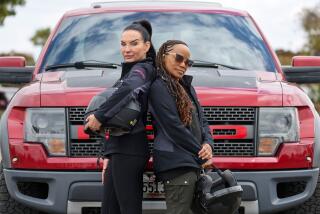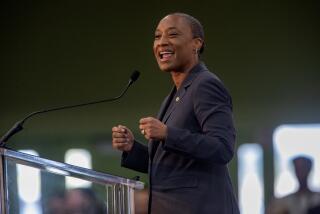Like Old Times for Customers, UPS Drivers
- Share via
It was 10:05 Wednesday morning when the boxy brown form came shimmering over the horizon and into view. It appeared suddenly amid the waves of heat rising from the intersection of Laurel Canyon and Chandler boulevards, bound for the Chandler Convalescent Hospital with a load of medical supplies.
The driver of United Parcel Service truck No. 136239, a profoundly tanned, hoop-earringed woman in company brown, wore a broad grin as she pulled into the hospital’s driveway to make her first delivery of the day.
The American economy could exhale. Kelly Barton was back on the case.
“Dollink,” said the elderly receptionist at Chandler Convalescent as she hugged Barton. “How was your vacation?”
Barton’s first day back on the job was a sweaty, frenetic confirmation of what people from President Clinton down had been saying since the recently concluded Teamsters strike against UPS began: that the essence of the company’s success in capturing almost two-thirds of the parcel delivery market was in the personal chemistry that route drivers such as Barton brewed with customers.
Barton, 34, is an assertive, irreverent woman who has worked for UPS for 16 years, the last 13 as a driver. She’s one of about 70,000 UPS parcel delivery drivers who make up more than a third of the company’s union work force.
In the course of her workday traversing the broiling grid of North Hollywood’s streets, she made 160 stops. She stopped at schools, drugstores and dry-cleaning shops, at banks, law offices and apartments. For some customers, her return marked a quiet but welcome restoration of business as usual. For others it was a bit of a love fest.
In every case, Barton found it a welcome contrast to the anger and anxiety she had felt on the picket line and at home in the final days before the strike’s settlement.
“Kelly’s very reliable,” said Chandler Convalescent administrator Marilynn Rebhun. “We have a lot of fragile lives around here, and she gives us a sense of security. I don’t want to compare it with looking for my husband’s car to come home, but I do look for her brown truck every day.”
A few minutes later, having dropped off a large box elsewhere in an office building at Laurel Canyon and Weddington, Barton stuck her head into H & R Associates. She had nothing to deliver, but wanted to reestablish contact.
“How nice to see you!,” exclaimed Harriet Dobrin, the “H” in H & R, which places advertising in military publications and ships a score of items with Barton each week. “UPS called me yesterday and asked if we were coming back. I said sure.”
“Who did you use while I was gone?” Barton asked.
“Puh-LEASE. The post office.”
After delivering a heavy box of textbooks to the Country School and making a stop at an apartment building, Barton pulled her van, horn blaring, to a stop in front of Twin Tech Performance motorcycle shop.
“We use her every day,” said Twin Tech owner Don Thut. “I should have about a six-week backlog of parts coming. Man, we’re totally out of parts. But Kelly makes sure our stuff’s here every morning. She takes care of us big time.”
The energy Barton poured into cementing UPS’s relationships with customers on her first day back had been dedicated to an opposing purpose during the strike.
Nearly every day last week, she had been among the most animated and vocal strikers on the picket line at the UPS hub in Van Nuys. She had leaped back and forth from sidewalk to roadway, whooping and shaking her picket sign, delighting when passing cars bleated and big rigs sounded their train-like horns in response.
“To me, it’s easier to be here,” she had said last Friday, her picket sign resting on her shoulder. “I feel like I’m part of the cause. Everybody else is here. We’re all in the same boat. I feel like I have to be here for everybody else. We’ve gotten so close in the last two weeks, once I get here it’s kind of hard to leave.”
Friday had been a case in point. After a week of marathon picketing days, Barton and her husband, Craig, also a striking UPS driver with a route in Sherman Oaks, stopped by the line about 11 a.m. They had intended to spend the rest of the day on their ski boat.
At 8 that evening, however, Barton was still hailing cars, while 6-year-old Garett and 4-year-old Jessica alternately carried picket signs, played on the stained sidewalk and sprawled on their father’s lap curbside.
“This kind of became our family day,” Craig Barton had said.
For Kelly Barton, the determination and high spirits of the picket line were backlighted by a dull anxiety and colored by an internal conflict.
To begin with, her family’s weekly income had plunged from $2,300 to $110 in strike benefits.
Before the strike, she counted herself among the half-dozen most productive drivers of the 61 in her division at the Van Nuys hub. As one of only a few female route drivers at her center, she was determined to “look like a girl”--with bright lipstick and long, rasberry-colored nails--while performing heavy manual labor.
Her hard-charging ways frequently meant she was gone from home 12 hours a day, and had to leave her children in day care till evening. With the children certain to need more chauffeuring as they grew into after-school sports and other activities, Barton often thought about finding less time-consuming work.
The problem was, a person got used to the money. “How many jobs pay you $60,000 a year without college?” she had asked. “I mean, all I know is how to drive a truck and how to work hard.”
Besides, having worked for UPS since she was an 18-year-old, fresh out of La Puente High School, she strongly identified with the company.
“It’s like family,” she had said on the picket line. “Every time I see those UPS planes in the sky, I feel a little ping in my heart. It’s sad to see the trucks just standing there and know it’s my job and I can’t do it.”
The Bartons live in a high-ceilinged, two-bedroom house in Simi Valley, the patio of which looks out on a golf course; Kelly Barton bought the place for $186,000 in 1985, three years before she and Craig married.
During the strike, the bright, breezy house was where fear and depression tended to rest most heavily on her as she tended to domestic chores and monitored the talking heads on CNN for news.
The strike was in its second week before Barton could make herself even look at help-wanted ads in the newspapers. “I just didn’t want to work anyplace else.”
Craig Barton had resurrected an off-again, on-again car detailing business in which he charged $100 per auto. In the strike’s second week, he had found seven such jobs.
That, however, wasn’t going to cover the household’s monthly bill total of $5,000, which included a $1,500 mortgage payment, $1,100 for Kelly’s 1994 GMC Suburban and Craig’s 1996 Chevy double-wheeled bed pickup truck, $300 for the ski boat and $400 for gasoline.
The couple, Kelly Barton said, always lived close to the edge; “You make a lot of money, you spend a lot of money; we work hard and play hard,” she said.
Her money worries subsided quickly Monday evening when, after a day on the picket line, a co-worker called to tell her of the strike settlement.
With the strike over, her priorities had shifted toward reconnecting with the people she regularly encountered on her route. At the Mailboxes Etc. store at Laurel Canyon and Riverside, a score of outgoing boxes was piled behind the counter awaiting Barton who, glistening with sweat and smiling, was hand-trucking in an almost equal number.
“I’ve known Kelly for almost 10 years, and it just hasn’t been the same without her the last couple of weeks,” said manager David Alter. “She always comes in and peps people up, even the customers.”
As Barton hurried for the door again, a customer who hadn’t seen her since the strike began called out, “Hey, did you get what you wanted?”
“I got what I wanted,” she called back.
As the door closed behind her, a small girl standing with a woman at a copying machine asked, “Who is that lady, Mom?”
“That lady,” said the woman, pausing dramatically, “is the UPS delivery lady, honey.”
More to Read
Sign up for Essential California
The most important California stories and recommendations in your inbox every morning.
You may occasionally receive promotional content from the Los Angeles Times.













